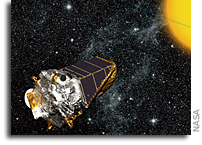Advances in exoplanet science from Kepler

Jack J. Lissauer, Rebekah I. Dawson, Scott Tremaine
(Submitted on 4 Sep 2014)
Numerous telescopes and techniques have been used to find and study extrasolar planets, but none has been more successful than NASA’s Kepler Space Telescope. Kepler has discovered the majority of known exoplanets, the smallest planets to orbit normal stars, and the worlds most likely to be similar to our home planet. Most importantly, Kepler has provided our first look at typical characteristics of planets and planetary systems for planets with sizes as small as and orbits as large as those of the Earth.
Comments:
33 pages, 4 figures, submitted to Nature Insight
Subjects:
Earth and Planetary Astrophysics (astro-ph.EP)
Cite as:
arXiv:1409.1595 [astro-ph.EP] (or arXiv:1409.1595v1 [astro-ph.EP] for this version)
Submission history
From: Scott Tremaine
[v1] Thu, 4 Sep 2014 20:15:12 GMT (2153kb,D)
http://arxiv.org/abs/1409.1595
X








